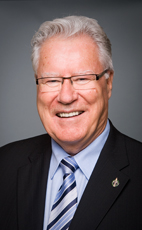Mr. Chair, I will be sharing my time this evening with the member for Oak Ridges—Markham and the member for Edmonton Centre. Mr. Chair, I thank you and the members of the committee for allowing me to contribute to the Department of National Defence expenditures discussion.
Allow me a minute to recognize with thanks the NFTC program that is alive and well at 15 Wing Moose Jaw and also recognize the reserve units that are very well placed in Moose Jaw and Regina. We thank them for all that they are and for all that they do.
I would like to use this time to talk about the Canadian Forces' international operations.
The good work of our forces extends far beyond Canada's borders, with more than 3,700 Canadian soldiers, sailors and air force personnel currently deployed on international operations. On any given day, about 8,000 Canadian Forces members, one-third of our deployable force, are preparing for, engaging in, or returning from an overseas mission.
We have committed our military because we know that security in Canada begins with stability abroad and because it is within our capabilities to make positive changes in the world. This is why our Canadian Forces continue to work with our national and international partners to find peaceful solutions to decades-old conflicts and disputes and to fight where we need to fight. The Canadian Forces are currently involved in 16 operations around the world, from the Balkans to the Congo and from the Middle East to Darfur.
Today, their largest operation and Canada's highest international priority is the mission in Afghanistan. Under a United Nations Security Council mandate and alongside ISAF, our forces have been engaged in Afghanistan for more than eight years. From operations in the rugged terrain of Kandahar to training the Afghan national army and police, Canadian men and women are working alongside Afghans to combat terrorism and to build a country better governed, more peaceful and more secure.
As important as Afghanistan is, however, this is only one of many missions where our forces are engaged or have recently been engaged in operations and indeed are making a difference.
For example, the Canadian Forces have 55 personnel deployed in the Middle East where our forces have had a presence since the Suez crisis of 1956. They are engaged in a number of different operations in the region working with multinational and binational partners to bring stability and to build the security so badly needed for peace to take hold.
Canada contributes to the multinational force and observers in the Sinai Peninsula through Operation Calumet, a mission that oversees the implementation of the peace treaty between Egypt and Israel. Canada is also present in the United Nations Disengagement Observer Force on the Golan Heights, which supervises the ceasefire between Israel and Syria, and in the United Nations Truce Supervision Organization, which observes and maintains the ceasefire between Israel and Egypt, Lebanon, Jordan and Syria. It is a lot of work for very few people.
Also in the Middle East, Canadian Forces are doing some extraordinary work in support of U.S. efforts to build peace and security for Israel and for the Palestine folks. Through Operation Proteus, 17 members of the Canadian Forces and two Canadian civilians are working side by side with American, British and Turkish military personnel as part of the United States security coordinator's mission. This mission works to build the foundations of a modern and professional security and justice system in the West Bank.
These efforts, responding directly to the needs of the Palestinians and Israelis, have already borne significant fruit and are a key element to building the trust necessary to revive peace efforts.
Our Canadian Forces are also making a difference in Africa, with over 50 personnel currently deployed in that area. Operation Safari is Canada's participation in the United Nations missions in Sudan. It is the military component of the Canadian whole of government engagement in southern Sudan.
The 30 CF personnel involved in Operation Safari are working to support implementation of the comprehensive peace agreement. They are also facilitating humanitarian assistance while working to protect and promote human rights. In Operation Saturn, Canadian Forces personnel participate in the African Union/UN hybrid operation in Darfur. In Operation Crocodile, our soldiers—

